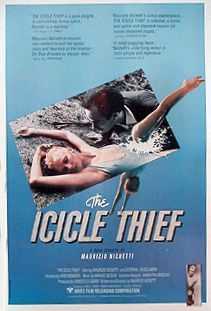The Icicle Thief
| The Icicle Thief | |
|---|---|
 Film poster | |
| Directed by | Maurizio Nichetti |
| Produced by | Ernesto Di Sabro |
| Written by |
Mauro Monti Maurizio Nichetti |
| Story by | Maurizio Nichetti |
| Starring |
Maurizio Nichetti Caterina Sylos Labini Federico Rizzo |
| Music by | Manuel De Sica |
| Cinematography | Mario Battistoni |
| Edited by | Rita Rossi |
| Distributed by | Bambú, Reteitalia |
Release dates |
|
Running time | 90 minutes |
| Country | Italy |
| Language |
Italian English |
| Box office | $1,231,622 (domestic)[1] |
The Icicle Thief (Italian: Ladri di saponette) is a 1989 Italian comedy film directed by Maurizio Nichetti, named in imitation of Vittorio De Sica's classic Italian neorealist film, The Bicycle Thief (Italian: Ladri di biciclette). Some feel "The Icicle Thief" was created as a spoof of neorealism, which predominated Italian cinema after World War II. However, it is generally understood to go beyond this and to take a stand against commercialism as destructive towards art. The film won the Golden St. George at the 16th Moscow International Film Festival.[2]
Plot
The movie begins with a self-regarding film director, played by director Maurizo Nichetti himself, discussing his latest film on an intellectual Italian TV channel which is about to broadcast it at short notice in place of a more highly regarded competitor’s. His ‘masterpiece’ follows the bleak travails of a poverty-stricken unemployed man (again played by Nichetti) who finds work in a chandelier factory, but cannot resist stealing one of the gleaming lights for his wife. The pompous director is initially pleased with the seriousness with which his work is analysed, but he then becomes distraught when his black-and-white opus is repeatedly interrupted by full colour commercials.
The TV audience is shown watching in their homes, completely oblivious of the interruptions and the 'outrages' perpetrated on the director’s artistic intentions.
Finally, a power failure in the studio results in (colour) characters from the adverts appearing in the (black-and-white) film after the commercial breaks, and interacting with the film's protagonists, thus completely changing the course of the plot and the concept of the film-within-a-film. The director himself is drawn into his own movie via the TV studio’s television set, and begins arguing with the characters.[3][4]
Wordplay translation
The film's Italian title Ladri di saponette, a play on the Italian title of De Sica's film, means "Soap Thieves"; it is justified by dialogue where a boy is told not to use up all the soap when washing his hands, and his mother wonders if he is eating it. For English-speaking audiences, the title was changed to The Icicle Thief, playing on the English title of De Sica's film. This title was justified by changing the wording of the English subtitles when the characters talk about some chandeliers and one is stolen. In the original Italian dialogue they are said to sparkle like pearls (pèrle) and drops of water (gocce), but in the English subtitles, they look "like icicles" (which in Italian would be ghiaccioli).
References
- ↑ http://www.boxofficemojo.com/movies/?id=iciclethief.htm
- ↑ "16th Moscow International Film Festival (1989)". MIFF. Retrieved 2013-02-24.
- ↑ James, Caryn (1990) "The Icicle Thief (1989)", New York Times, August 24, 1990. Retrieved 11 Sept. 2014
- ↑ Michael Brooke (no date). “The Icicle Thief (1989) Plot Summary”, IMDb (no date). Retrieved 12 Sept. 2014
External links
- The Icicle Thief at the Internet Movie Database
- The Icicle Thief at Box Office Mojo
- The Icicle Thief on moria.co.nz